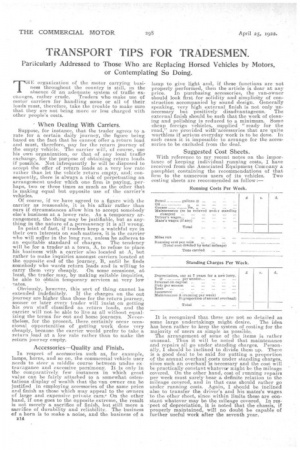TRANSPORT TIPS FOR TRADESMEN.
Page 18

If you've noticed an error in this article please click here to report it so we can fix it.
Particularly Addressed to Those Who are Replacing Horsed Vehicles by Motors, or Contemplating So Doing.
THE organization of the motor carrying business throughout the country is still, in the absence of an adequate system of traffic exchanges, rather crude. Traders who make use of motor carriers for handling some or all of their loads must, therefore, take the trouble to make sure that they are not being more or less charged with other people's costs.
• When Dealing With Carriers.
Suppose, for instance, that the trader agrees to a rate for a certain daily journey, the figure being based on the fact that he cannot offer a return load and must, therefore, pay for the return journey of the empty vehicle. The carrier will, of course, use his own organization, or that of any local traffic) exchange, for the purpose of obtaining return loads if possible. Not infrequently he will be disposed to aceept the offer of return loads at a very low rate rather than let the vehicle return empty, and; eonsequently, there is always a risk of perpetuating an arrangement under which one firm is paying, .perhaps, two or three times as much as the other that is making equal but opposite use of the carrier's vehicles.
Of course, if we have agreed to a figure with the earrier as reasonable, it is his affair rather than ours if circumstances allow him to accept somebody else's business at a lower rate. As a temporary arrangement, the thing may be justifiable, but as anything in the nature of a. permanency it is all wrong.
In point of fact, if traders keep a watchful eye in their own interests on such matters, it is the carrier who will suffer in the long run, unless he adheres to an equitable standard of charges. The tendency will be for a trader, at a town, A, to refuse to place his business with a carrier also located at. A, but rather to make inquiries amongst carriers located at the opposite end of the journey, B, until he finds somebody who wants return loads and is williag to carry them very cheaply. On some occasions, at least, the trader may, by making suitable. inquiries, be able to obtain temporary services at very low rates.
Obviously, however, this sort of thing cannot be extended indefinitely. If the charges on the out journey are higher than those for the return journey, sooner or later every trader will insist. on getting his own stuff classified as return loads, and the carrier will not be able to live at all without equalizing the term S for out and home journeys. Nevertheless, for the present, there certainly occur occasional opportunities of getting work done very cheaply, because the carrier would prefer to take a return load at a low rate rather than to make the return journey empty.
Accessories—Quality and Finish.
In respect of accessories such as, for example, lamps, horns, and so on, the commercial vehicle user needs to steer a middle course between undue oe travagance and excessive parsimony. It is only in the comparatively few instances in which great value can be fairly attached to a somewhat ostentatious display of wealth that the van owner can be justified in employing accessories of the same price and finish as those which may appeal to the owners of large and expensive private cars.' On the other hand, if one goes to the opposite extreme, the result is not merely a sacrifice of finish, but still more a sacrifice of durability and reliability. The business of a horn is to make a noise, and the business of a E14 lamp to give light and, if these functions are not properly performed, then the article is dear at any
price. In purchasing accessories, the van-owner should look first for solidity and simplicity of construction accompanied by sound design. Generally speaking, very high external finish is not only unnecessary but positively disadvantageous. The external finish should be such that the work of cleaning and polishing is reduced to a. minimum,. Some cheap foreign vehicles, supplied " ready for the road," are provided with–accessories that are quite worthless if serious everyday work is to be done. In such cases it is impossible to arrange for the accessories to be excluded from the deal.
Suggested Cost Sheets.
With reference to my recent notes on the importance of keeping individual running costs, I have received from the Associated Equipment Connally a pamphlet containing the recommendations of that firm. to the numerous users of its vehicles. Two costing sheets are recommended as follow:—
It is recognized that these are not so detailed as some large undertakings might desire. The idea has been rather to keep the system of costing for the majority of users as simple as possible.
The arrangement of some of the items is rather unusual. Thus it will be noted that maintenance and repairs all go under standing charges. Personally, I should be inclined to divide them up. There is a good deal to be said for putting a proportion of the annual overhaul costs under standing charges, since such au overhaul is necessary and the cost will be practically constant whatever might be the mileage covered. On the other hand, cost of running repairs per week must surely bear a definite relation to the mileage covered, and in that case should rather go under running costs. Again, I should be inclined also to transfer the driver's and his mates's wages to the other sheet, since within limits these are con• stunt whatever may be the mileage covered. In res-pect of depreciation, it is noted that the chassis, if properly maintained, will no doubt be capable of further useful work after the seventh year,






























